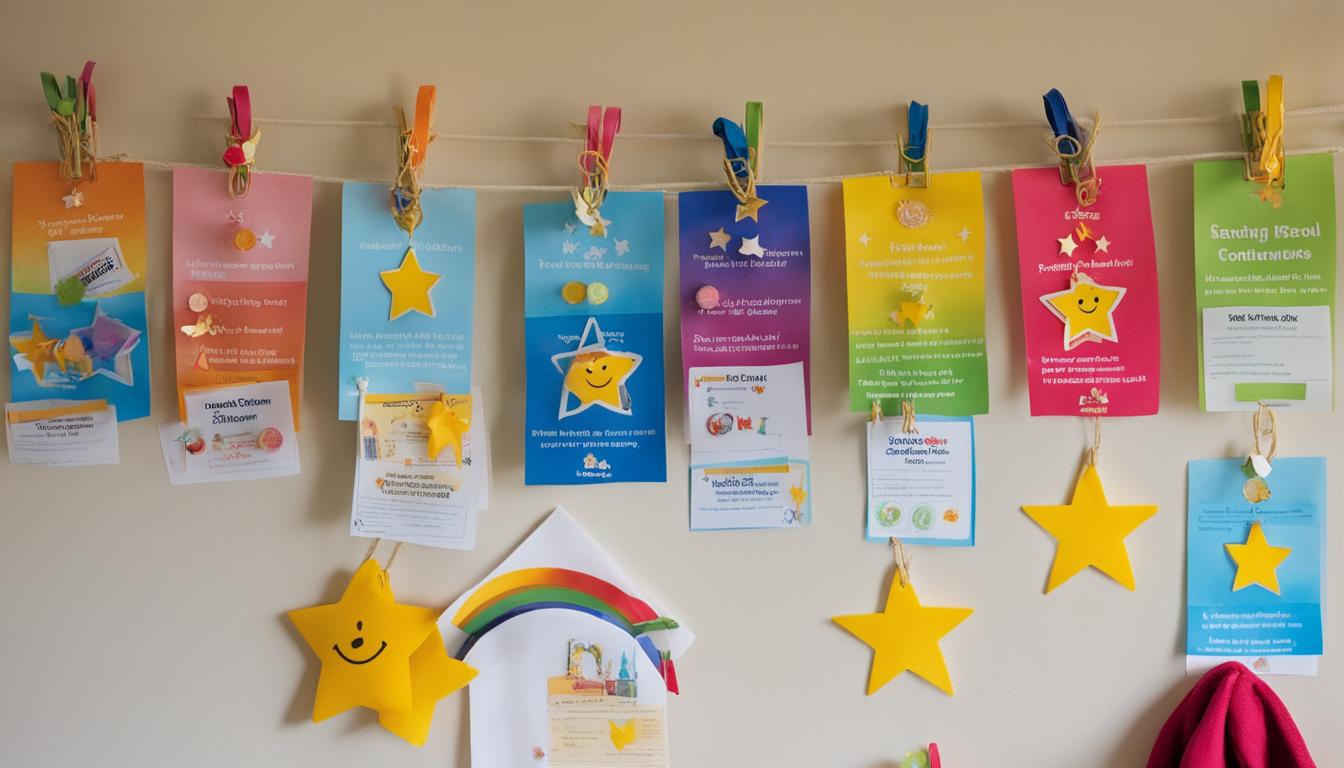Parenting Tips for Enforcing Family Rules: Laying the Groundwork
As a parent, I’ve learned that establishing household routines and promoting positive behavior starts with clear and consistent family rules. It’s the invisible baseline that supports the day-to-day structure kids thrive on. With my own experience and insights from parenting experts, I want to share how you can implement effective parenting strategies to ensure your home is a haven of order and understanding.
Consistency, predictability, and follow-through are the pillars that hold up the delicate balance of discipline and care within the walls of a home. By setting specific rules and sticking to them, children learn not just about what behaviors are expected, but also about the stable environment that they can always count on. Let’s dive into how you can enforce these rules to nurture your child’s growth and maintain peace at home.
Skip To The Following Sections
- Understanding the Role of Clear Family Guidelines
- The Importance of Consistency in Rule Enforcement
- Setting Realistic and Positive Consequences for Behavior
- Establishing Open and Healthy Communication
- Creating a Cooperative Atmosphere for Following Rules
- FAQ
- How can I effectively promote positive behavior in my family?
- What parenting tips for enforcing family rules are most important?
- Why is consistency important when enforcing rules?
- How can we foster respect and cooperation in following family rules?
- What are some effective discipline techniques for enforcing family rules?
- What should I consider when establishing consequences for my child’s behavior?
- How can I teach my child responsibility through consequences?
- How can I balance discipline with positive reinforcement?
- How do I encourage my child to openly communicate with me?
- How can we create a cooperative environment for following family rules?
- Source Links
Key Takeaways
- Focusing on a few critical rules initially helps children learn and adhere to guidelines more effectively.
- Consistency in rule enforcement promotes a sense of security and clear expectations.
- Open communication about the reasoning behind rules can foster understanding and cooperation.
- Real-world consequences for rule-breaking teach responsibility, while positive reinforcement encourages good behavior.
- Involving children in rule-setting can create a sense of fairness and shared family values.
Understanding the Role of Clear Family Guidelines
As a parent, my role extends beyond providing for basic needs; it’s about setting boundaries that cultivate an environment where my child can grow into a responsible adult. These boundaries hinge on the establishment of clear family guidelines that delineate the behaviors expected within our home. For me, these guidelines serve as a beacon that guides my parenting and disciplines decisions.

It’s not just about crafting a rigid set of rules; it’s about creating a framework that allows for fostering respect and cooperation between family members. And I’ve found that the most impactful guidelines are those that leave no room for ambiguity, especially on critical issues such as substance use and safety. With these non-negotiables firmly set, the rules become more than just words; they become a steadfast foundation for family functioning.
Consider this: research indicates a noticeable reduction in underage drinking when parents explicitly communicate their non-tolerance stance. This goes to show the potency of clear expectations. By firmly stating my rules around drugs, alcohol, tobacco, and driving safety, I’m able to provide a clear-cut path for my children to follow. There’s power in the clarity of a rule that states, “No underage drinking, no exceptions.”
By including my children in the rule-setting process, I’ve noticed they’re more inclined to adhere to these guidelines. It’s a two-way street; I share my experiences and the reasoning behind the rules, and they, in turn, feel heard and respected. This mutual respect is pivotal, it encourages them to abide by the rules not out of fear, but out of understanding and a shared sense of responsibility.
Clear family guidelines are the infrastructure within which my children learn to navigate not only our home but also the world beyond our doorstep.
Ultimately, these guidelines are more than just mechanisms for control; they’re tools for my children to gauge their own behavior and make wise decisions. And as they mature, these rules evolve, adapting to their growing sense of independence and allowing them to test the waters of autonomy in the safe harbor we’ve built together at home.
The Importance of Consistency in Rule Enforcement
In my journey as a parent, I’ve come to understand that consistent rule enforcement is not just beneficial, but essential for nurturing a sense of security and respect within the family. It’s about creating a reliable framework where my children can measure their actions and experience the stability of well-defined boundaries. I’ve learned that this consistency is crucial in helping them grasp the importance of each rule we set in place.

Maintaining a balanced approach, without swaying between too strict or too permissive, positions me to send a clear and unwavering message to my children. Such an approach enhances their understanding of expectations, making them more likely to respect and comply with our family’s guidelines. On the contrary, inconsistencies in enforcement can end up undermining my authority, potentially making my children question the seriousness of our rules, which in turn, can increase their propensity to break them.
Implementing effective discipline techniques begins with establishing authority through composed, emotion-free communications about family rules. This is a strategy that has worked for me in reducing confrontations. It creates a platform for learning and understanding, rather than a battleground of wills. I want to be clear: it’s not about exerting control but about guiding my children towards responsible self-regulation.
The consistent application of rules not only sets clear expectations but also eliminates confusion that could lead to rule-breaking.
When consequences for breaking family rules are necessary, I ensure they are just, reasonable, and explained ahead of time. This openness keeps my children from feeling targeted unfairly and provides a clear cause-and-effect scenario that they can learn from. By following through with the consequences we’ve laid out together, I reinforce the lesson that actions have repercussions, whether they are positive or negative.
- Structure and predictability through consistent rules provide a comforting routine that children can rely upon daily.
- Clarity in expectations prevents misunderstandings and promotes easier compliance amongst family members, from the youngest to the oldest.
- A consistent approach affirms my role as a guide, not a dictator, fostering a dynamic where respect is mutual and discipline is understood as a form of caring.
Remembering to practice what I preach, I show my children that the rules apply universally within our family, setting an example through my own actions. This aligns with the principle of consistent rule enforcement and exemplifies the integrity I hope to instill in them. After all, this consistency is a cornerstone in building a harmonious and respectful family environment, grounded in trust and mutual understanding.
Setting Realistic and Positive Consequences for Behavior
Throughout my parenting journey, one crucial aspect I’ve embraced is the implementation of consequences for child behavior that effectively underline our household rules. It’s not about punishment per se; it’s about crafting a teaching moment that underscores personal responsibility and positive life lessons. By setting consequences that are proportionate and relevant to their actions, I’ve noticed that my kids develop a sense of accountability that sticks with them beyond the childhood years.
How Consequences Teach Responsibility and Accountability
Creating a connection between actions and outcomes is fundamental in teaching responsibility to my children. I find that when the consequences align with the behavior, the message is clear and the learning is impactful. A disciplinary approach that reflects the severity of their choices allows for a sensible understanding of cause and effect. I’ve seen this approach foster better decision-making skills as my children learn that each decision carries weight.
Realistic consequences mean fair responses to my child’s behavior that instill an invaluable life lesson: every choice has an inherent result, either good or bad.
Let’s say one of the family rules is to finish homework before screen time. If this rule is breached, the natural consequence would be a limitation on screen time for that day. Simple, yet effective. This kind of tangible repercussion not only makes the rules real but also teaches my kids that slacking off bears outcomes they might not favor.
Balancing Discipline with Positive Reinforcement
Meanwhile, promoting positive behavior plays an equally significant role. Discipline is one aspect of parenting, but celebrating the wins is what brings joy and encouragement. It’s a cornerstone in the architecture of their self-esteem. Recognizing good choices and offering positive reinforcement such as praise or a special privilege for consistently following the rules emphasizes the rewards of behaviors we want to see repeated.
- Every time my child says “please” and “thank you,” a point of appreciation is expressed.
- Bedroom maintained tidy for a week? Maybe an extra thirty minutes of weekend screen time, or choosing what’s for dinner.
I see it as a balance beam where discipline and acknowledgment of positive actions co-exist. Too much weight on the discipline side and the beam tips leading to resentment; too much on the other and it might not take the rules seriously. It’s about finding that perfect equilibrium where deterrents for rule-breaking and incentives for upholding them have equal prominence.
- It’s the warm acknowledgment for a job well done that often stays in their memory, promoting positive behavior longer term.
- For every frown that a consequence might bring, a smile from praise can assert that while rules are in place, so is love and pride for their better decisions.
- Ultimately, my focus is on nurturing my child, teaching them the values that form the bedrock of a responsible adult down the road.
By emphasizing the benefits and the goodness in their compliant actions, I’m not just enforcing a rule – I’m elevating a standard of living that revolves around consideration, thoughtful responses, and mutual respect.
Establishing Open and Healthy Communication
As I navigate the complexities of parenting, I’ve found that encouraging healthy communication is a cornerstone in the foundation of our family’s well-being. It’s about laying down a two-way street where dialogue flows freely, allowing every voice to be heard and every opinion valued. This openness is integral to not only enforcing family rules but also to fostering respect and cooperation within our household. By nurturing this transparent atmosphere, my children learn to express themselves and more deeply understand the guidelines we’ve set together.
The art of dialogue is a delicate dance, and I’ve discovered that one of the most rewarding steps is encouraging your child to share their point of view. This approach doesn’t just honor their thoughts; it gives them a stake in the family dynamic. Validating their opinions doesn’t mean we forgo the rules; rather, it enriches the process, resulting in rules that reflect our collective understanding and shared values.
We say to our children: “Your thoughts matter. You matter.” This simple mantra opens the doors to heartfelt discussions and cooperative rule-making.
By listening, not just hearing, I show my children that I am fully present in our conversations. This attentiveness is one of the parenting tips for enforcing family rules that I’ve grasped over time. It’s about striking a balance between guiding them and giving them the freedom to explore their own reasoning. In turn, they learn to approach conversations with thoughtfulness, and our talks transform into opportunities to shape a family ethos rooted in mutual respect.
- Actively listen to each child’s thoughts and feelings rather than dictating rules unilaterally.
- Encourage openness, creating a safe zone where children can express disagreements or confusion about certain rules.
- Discuss the purpose behind each rule to instill a sense of understanding and personal responsibility in following them.
Our conversations are not simply about what’s permitted and what’s not. They’re about why we come to the table with these guidelines. When we discuss the rationale behind a rule, we are fostering respect and cooperation, giving these concepts the respect they deserve within the framework of our family life. As we share and shape these principles together, we fortify the bonds that make our family unit strong and resilient.
Creating a Cooperative Atmosphere for Following Rules
In my parenting journey, one of the greatest victories has been creating cooperative environments at home where every family member feels empowered to both follow and contribute to our family guidelines. This sense of shared responsibility comes from involving everyone in rule-setting discussions and decision-making processes. Fostering respect and cooperation through these inclusive practices allows each voice to resonate throughout our home, and transforms our rules into promises we keep with each other.
Part of consistent rule enforcement includes making our guidelines visible—literally. By posting our rules where they can easily be seen, I’ve noticed a substantial difference in how we reaffirm and reference them, especially in moments of potential conflict. This visual reminder serves as a nonverbal nudge, a gentle cue that helps us adhere to our agreed-upon path. Additionally, our rules aren’t static; they evolve as my children grow, ensuring that what we’ve set forth ages gracefully with their needs and our collective maturity.
Within our household, I ensure that the various expectations are clearly communicated, acknowledging that age and developmental milestones dictate different roles and responsibilities. This flexibility in our system demonstrates fairness and adaptability, vital qualities for sustained cooperation. Moreover, when rules are occasionally broken, consistently applied consequences underscore their importance, maintaining the delicate balance between structure and nurture. These are our touchstones for harmony, allowing for a home life where respect is as natural as breathing, and our commitment to each other is the cornerstone of every interaction.
FAQ
How can I effectively promote positive behavior in my family?
In my experience, promoting positive behavior is best achieved by setting clear expectations and establishing consistent household routines. Recognize and reward good behavior, provide frequent encouragement, and maintain a balance between structure and flexibility to create a nurturing environment that promotes positive behavior.
What parenting tips for enforcing family rules are most important?
The most critical parenting tips include setting clear boundaries, using effective discipline techniques, being consistent in your approach, and explaining the reasons behind rules. Also, remember to model the behavior you expect to see, involve children in rule-making when appropriate, and maintain open lines of communication.
Why is consistency important when enforcing rules?
Consistency in rule enforcement ensures that children understand the predictability and seriousness of household expectations. It fosters respect for family rules and minimizes confusion, which can lead to more cooperative behavior. Consistent enforcement also teaches children that consequences are a part of breaking rules, which is important for their development.
How can we foster respect and cooperation in following family rules?
Fostering respect and cooperation starts with setting clear and fair rules that are understood by all family members. Involving children in the rule-setting process, as well as explaining the reasons and benefits behind rules, can help. Emphasize respect and teamwork, and be a role model for cooperation in your family interactions.
What are some effective discipline techniques for enforcing family rules?
Some effective discipline techniques include setting clear consequences for rule-breaking, using time-outs, withdrawing privileges, and following through with agreed-upon consequences. It’s important to keep the discipline age-appropriate and to use these moments to teach lessons about behavior and responsibility.
What should I consider when establishing consequences for my child’s behavior?
When establishing consequences, consider whether they are realistic, appropriately matched to the behavior, clearly communicated, and consistently applied. Ensure that the consequences are constructive and help teach your child responsibility, such as having them contribute to a solution or make amends for their actions.
How can I teach my child responsibility through consequences?
Teaching responsibility through consequences involves ensuring that those consequences are directly related to the rule that was broken and understood by the child. Discuss the consequences with your child, emphasize the connection between actions and outcomes, and use these moments to encourage better decision-making in the future.
How can I balance discipline with positive reinforcement?
Balacing discipline with positive reinforcement includes recognizing and praising good behavior just as much as you enforce rules for bad behavior. Offer positive feedback, rewards, and additional privileges to encourage continued adherence to rules. This balanced approach not only reinforces what is expected but also builds self-esteem and a positive family dynamic.
How do I encourage my child to openly communicate with me?
Encourage open communication by actively listening to your child’s thoughts and opinions, responding without judgment, and expressing interest in their feelings and experiences. Create a safe space for conversation and reassure them that their perspective is valued. This establishes trust, which is the bedrock of healthy communication.
How can we create a cooperative environment for following family rules?
Creating a cooperative environment involves engaging family members in discussions about rules, valuing everyone’s input, and working together to establish mutually agreed-upon guidelines. Ensure that everyone understands their role in maintaining the harmony of the home, and demonstrate the importance of teamwork in achieving a peaceful and respectful family life.




